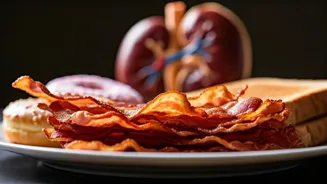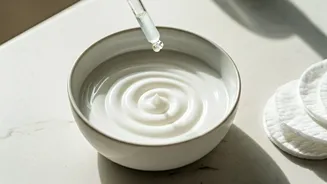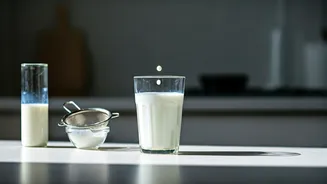Kidney Health: Explained
Your kidneys are crucial for filtering waste and toxins from your blood, regulating blood pressure, and producing hormones essential for various bodily
functions. Unfortunately, certain foods consumed regularly, particularly at breakfast, can hinder their ability to function optimally. This is because many common breakfast items are high in sodium, which can elevate blood pressure and stress the kidneys. Processed meats and certain dairy products often contain high levels of sodium. Additionally, foods loaded with sugar and unhealthy fats contribute to weight gain and inflammation, which further impacts kidney health. When these harmful foods are consumed regularly over extended periods, it can lead to a variety of kidney-related problems.
Processed Meat: Be Cautious
Processed meats like bacon and sausages are often breakfast staples, but they pose a significant risk to kidney health. The high sodium content in these foods can significantly raise blood pressure, placing excess burden on the kidneys. Preservatives frequently added to processed meats can exacerbate this effect. Moreover, the saturated fats found in these products contribute to inflammation, which can further impair kidney function. Consuming these foods regularly can lead to increased cardiovascular issues and kidney stress. Therefore, reducing your consumption of bacon, sausages, and other processed meats can substantially improve kidney health.
Sugary Pastries: Limit Intake
Sugary pastries and donuts are often tempting breakfast choices, but their nutritional composition is concerning for kidney health. These items are typically packed with sugar and trans fats. The high sugar content leads to rapid blood sugar spikes, potentially damaging kidney health over time. Trans fats contribute to weight gain and inflammation, creating further harm to the kidneys. Increased weight strains the kidneys, making them work harder, whereas chronic inflammation can impair their filtration capabilities. Minimizing your intake of donuts, pastries, and other sweet breakfast treats becomes imperative to protect your kidney health and overall well-being.
Cheese & Cream: Sodium Alert
Cheese and cream spreads are frequently used to enhance the taste of breakfast meals, but they come with a high price due to their impact on kidney health. These spreads often contain high amounts of sodium and saturated fat, both of which contribute to kidney problems. Increased sodium intake elevates blood pressure, putting extra pressure on the kidneys. Saturated fats promote inflammation and can contribute to cardiovascular problems, further diminishing kidney health. Limiting the consumption of cheese and cream spreads, particularly those high in sodium and saturated fat, is critical for protecting your kidneys and avoiding cardiovascular issues.
Refined Carbs: Smart Choices
White bread and other refined carbohydrates are popular breakfast options that can pose a risk to kidney health. Consuming refined carbs results in rapid blood sugar spikes, which over time can damage the kidneys. This effect is especially concerning for individuals with diabetes, as uncontrolled blood sugar levels greatly exacerbate kidney damage. Refined carbohydrates lack essential nutrients and fiber, contributing to weight gain and overall poor health, which can further strain the kidneys. Making smarter breakfast choices, such as whole-grain bread or oatmeal, can substantially reduce the risk of kidney damage and improve overall health, especially for those at high risk, such as people with diabetes.
Packaged Cereals: Watch Out
Packaged cereals often appear convenient, but they may contain hidden ingredients that can negatively impact kidney function. Many cereals are loaded with added sugar and phosphorus additives, both of which are undesirable for kidney health. High sugar levels can contribute to blood sugar spikes and damage over the long term. Phosphorus additives, commonly used to enhance shelf life and texture, can harm kidney function if consumed excessively. Always check the nutrition labels for excessive sugar, phosphorus, and sodium content. Making informed decisions about your breakfast choices can help to protect kidney health and reduce potential risks.














